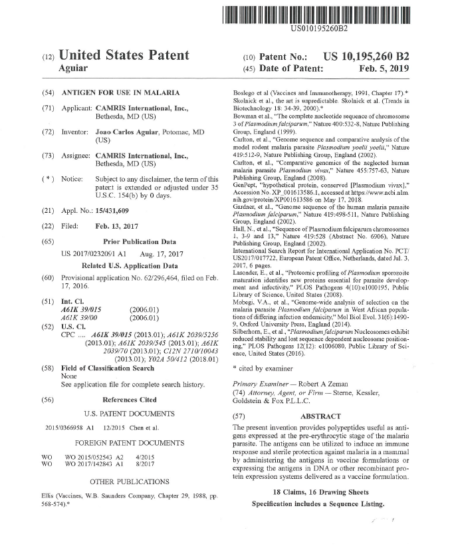05.30.2019
CAMRIS Awarded Patent for Anti-Malaria Antigens

The United States Patent and Trademark Office recently awarded CAMRIS a patent, patent number US 10,195,260B2, for a potential anti-malaria vaccine. The CAMRIS invention provides polypeptides that are useful as antigens expressed at the pre-erythrocytic stage of the malaria parasite. The E140 antigen can be utilized in vaccine formulations or by expressing the antigen in DNA, viral constructs or other recombinant protein express systems delivered as a vaccine formulation. The E140 antigen protection levels are exceptionally high and unprecedented in malaria pre-clinical research.
Malaria, a mosquito-borne disease, causes fever, intense chills, and other flu-like symptoms; in severe cases, it can lead to seizures, anemia, acute kidney damage, and respiratory problems. The World Health Organization estimates that there were 219 million cases of malaria worldwide in 2017, with 435,000 recorded deaths (https://bit.ly/2VwXPVH).
The CAMRIS malaria team, led by renowned scientist Dr. João Aguiar, has been conducting malaria antigen discovery work for the Naval Medical Research Center (NMRC) since 2011. Dr. Aguiar, a malaria development expert, brings decades of experience in antigen discovery and vaccine development, efficacy evaluation of novel antigens, implementation of novel protein expression systems, and malaria field studies. Dr. Aguiar’s expertise has helped enable CAMRIS to provide excellent guidance in the planning and implementation of antigen discovery work at NMRC. The CAMRIS team’s commitment to maintaining a collaborative environment and to partnering with the private sector, academic intuitions, and government agencies has led to significant progress in the global fight against malaria.
Finding an anti-malaria vaccine, however, has presented significant challenges to CAMRIS researchers, as the disease is caused by five species of Plasmodium, each of which has a complex life cycle and over 5,000 genes. Despite this, the CAMRIS team has remained undeterred in their quest to identify, characterize, and test antigens that can induce a protective immune response against malarial infection.
The discovery of the anti-malaria antigens allows CAMRIS to continue our efforts to reduce the global burden of the disease. In addition to this work at NMRC, CAMRIS’ efforts to combat malaria have included and include developing and implementing research products and controlled human malaria infection (CHMI) clinical trials at the Walter Reed Army Institute of Research (WRAIR); providing technical and programmatic guidance to the President’s Malaria; and conducting research on the epidemiology, ecology, and social and economic impacts of malaria under the Field Research in Infectious and Emerging Disease (FRIED) program for the Naval Medical Research Unit 6 Perú (NAMRU-6).
CAMRIS President and Chief Executive Officer Dr. Laurence Day stated, “This patent is an important milestone in our ongoing work with NMRC and other partners to develop effective solutions to pressing global needs in medicine and public health. The invention represents a breakthrough in the development of a new generation of anti-malaria vaccines that we hope to put within reach of the hundreds of millions of individuals who live in areas where malaria is endemic.”
CAMRIS has experience throughout the stages of vaccine development, from early testing with molecules, antigens, antibodies, and genomic variants, to in vitro and in vivo experiments, and ultimately to human clinical trials and FDA regulatory applications and filings. Visit CAMRIS Military Health & Research and CAMRIS Clinical & Life Sciences to learn more about our work in vaccines.